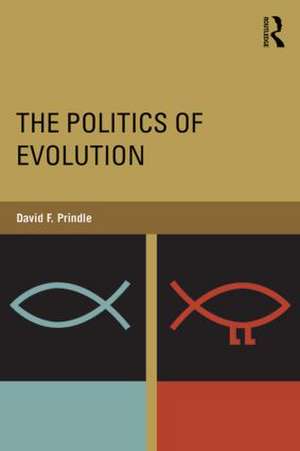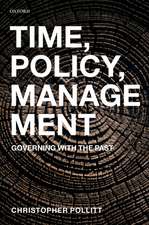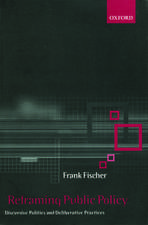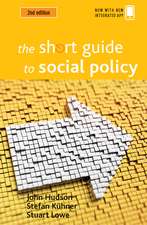The Politics of Evolution
Autor David Prindleen Limba Engleză Paperback – 13 apr 2015
Drawing on a vast body of work across the natural sciences, social sciences, and humanities, Prindle explores the rhetoric of the evolution issue, explores its history, examines the nature of the public opinion that causes it, evaluates the Constitutional jurisprudence that upholds it, and explains the political dynamic that keeps it going. This incisive analysis is a must-read in a wide range of disciplines and for anyone who wants to understand the politics of biology.
| Toate formatele și edițiile | Preț | Express |
|---|---|---|
| Paperback (1) | 442.93 lei 6-8 săpt. | |
| Taylor & Francis – 13 apr 2015 | 442.93 lei 6-8 săpt. | |
| Hardback (1) | 1053.16 lei 6-8 săpt. | |
| Taylor & Francis – 20 apr 2015 | 1053.16 lei 6-8 săpt. |
Preț: 442.93 lei
Nou
Puncte Express: 664
Preț estimativ în valută:
84.76€ • 90.63$ • 70.67£
84.76€ • 90.63$ • 70.67£
Carte tipărită la comandă
Livrare economică 17 aprilie-01 mai
Preluare comenzi: 021 569.72.76
Specificații
ISBN-13: 9781138887848
ISBN-10: 1138887846
Pagini: 198
Ilustrații: 8 black & white tables
Dimensiuni: 152 x 229 x 13 mm
Greutate: 0.3 kg
Ediția:1
Editura: Taylor & Francis
Colecția Routledge
Locul publicării:Oxford, United Kingdom
ISBN-10: 1138887846
Pagini: 198
Ilustrații: 8 black & white tables
Dimensiuni: 152 x 229 x 13 mm
Greutate: 0.3 kg
Ediția:1
Editura: Taylor & Francis
Colecția Routledge
Locul publicării:Oxford, United Kingdom
Public țintă
General, Postgraduate, and UndergraduateCuprins
Selected Contents: 1. Biology, the Most Political science 2. Evolution and Metaphor 3. Evolution and Religion 4. Public Opinion and Evolution 5. The Jurisprudence of Evolution 6. Evolution and the Party Battle
Recenzii
"In this eminently readable and thoroughly researched volume, political scientist David Prindle addresses the political implications of evolution, and particularly the debate over the teaching of evolution and creationism, including intelligent design, in public schools. Prindle argues convincingly that politics and science are inextricably intertwined; his thought-provoking message will spark discussion in the evolutionary sciences, history, philosophy, religion, and education, and should be read by anyone interested in the evolution-creationism controversy."—Dr. Patricia H. Kelley, University of North Carolina Wilmington
Buttressed by an extensive bibliography as well as his own experiments in pedagogy, Prindle suggests that the 'teach the controversy' strategy championed by creationists may actually be the best way to explore the science and expose the fallacies of creationism. In the end, he has no answer for the problem (democracy versus science) that he identifies, but the path toward that lack of a conclusion is thought provoking and insightful. --D. A. Rintoul, Kansas State University CHOICE
Buttressed by an extensive bibliography as well as his own experiments in pedagogy, Prindle suggests that the 'teach the controversy' strategy championed by creationists may actually be the best way to explore the science and expose the fallacies of creationism. In the end, he has no answer for the problem (democracy versus science) that he identifies, but the path toward that lack of a conclusion is thought provoking and insightful. --D. A. Rintoul, Kansas State University CHOICE
Notă biografică
David F. Prindle is a professor in the Department of Government at University of Texas at Austin. He has published research in the areas of voting and parties, energy policy, the presidency, and the politics of the entertainment media.
Descriere
The controversy over teaching evolution or creationism in American public schools offers a policy paradox. Two sets of values—science and democracy—are in conflict when it comes to the question of what to teach in public-school biology classes. Prindle illuminates this tension between American public opinion, which clearly prefers that creationism be taught in public schools, versus the democratic ideal held by virtually every person in the country. This incisive analysis is a must-read in a wide range of disciplines and for anyone who wants to understand the politics of biology.













